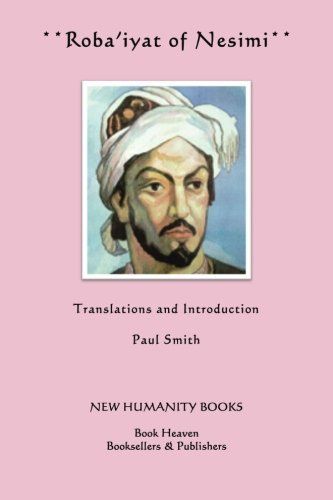
Roba'iyat of Nesimi
**ROBA'IYAT OF NESIMI**Translation & Introduction by Paul SmithNesimi (1369-1417) is one of the great spiritual poets of the late 14th and early 15th centuries and one of the masters in Turkish/Azerbaijani literary history. For Nesimi at the centre of Creation there was God, who bestowed His Light on man. Through sacrifice and self-perfection, man can become one with Him. His poems were considered heresy and he skinned alive as punishment. His tomb in Aleppo remains an important place of pilgrimage to this day. His Turkish roba'iyat consists of about 175 roba'is, 13 in Persian (most are here translated). The 600th anniversary of Nesimi's birth was celebrated by UNESCO. Introduction on his life & times & a history of the roba'i with translations and a bibliography. The correct rhyme-structure has been kept as well as the beauty and meaning of these beautiful, powerful, mystical poems. 169 pagesCOMMENTS ON PAUL SMITH'S TRANSLATION OF HAFIZ'S 'DIVAN'.“It is not a joke... the English version of ALL the ghazals of Hafiz is a great feat and of paramount importance. I am astonished. If he comes to Iran I will kiss the fingertips that wrote such a masterpiece inspired by the Creator of all.” Dr. Mir Mohammad Taghavi (Dr. of Literature) Tehran.“Superb translations. 99% Hafiz 1% Paul Smith.” Ali Akbar Shapurzman, translator of many mystical works in English into Persian and knower of Hafiz's Divan off by heart.“I was very impressed with the beauty of these books.” Dr. R.K. Barz. Faculty of Asian Studies, Australian National University.“Smith has probably put together the greatest collection of literary facts and history concerning Hafiz.” Daniel Ladinsky (Penguin Books author of poems inspired by Hafiz). Paul Smith is a poet, author and translator of over 80 books of Sufi poets of the Persian, Arabic, Urdu, Turkish, Pashtu and other languages… including Hafiz, Sadi, Nizami, Rumi, 'Attar, Sana'i, Jahan Khatun, Obeyd Zakani, Nesimi, Kabir, Anvari, Ansari, Jami, Khayyam, Rudaki, Yunus Emre, Lalla Ded, Rahman Baba, Mahsati, Mu'in and many others, as well as poetry, fiction, plays, biographies, children's books and 12 screenplays.